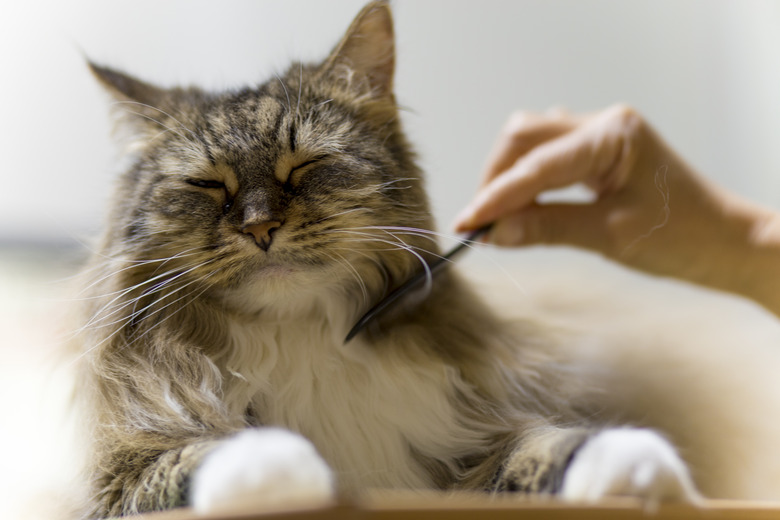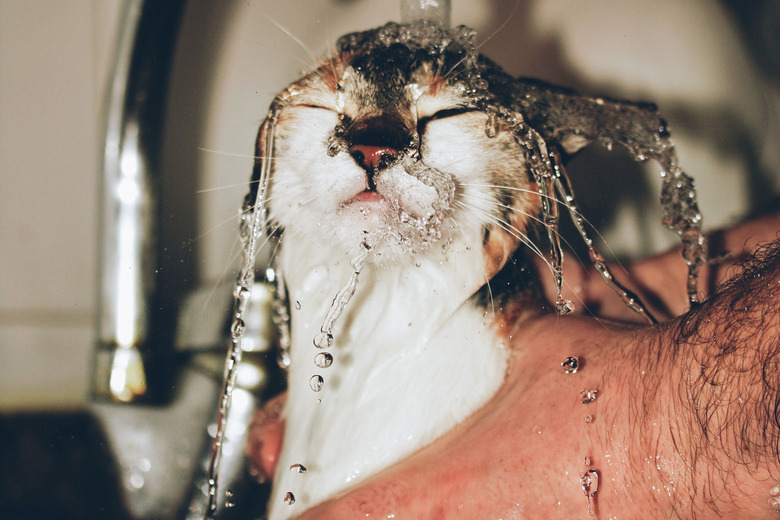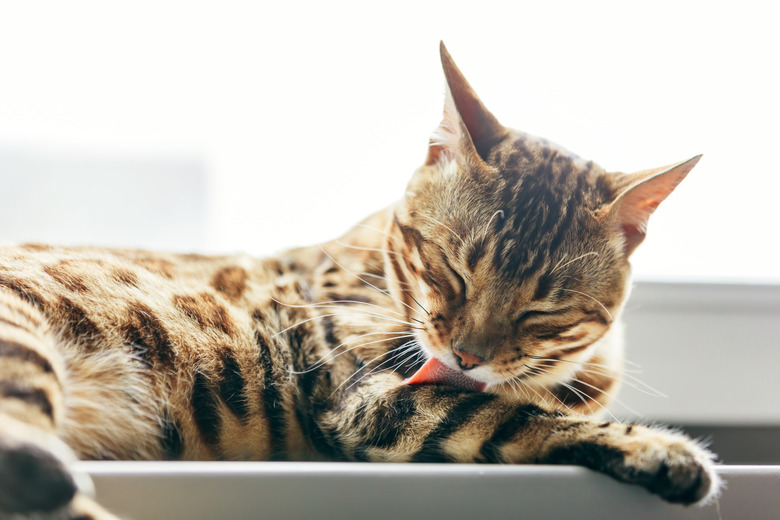How To Clean Poop From A Cat's Bum
If your kitty has a bout of diarrhea or has trouble grooming and gets poop stuck on their rear end, they'll need your help cleaning up. Fecal matter stuck to cat fur can be a sign of a serious cat health problem. Your feline may have a gastrointestinal infection or a parasitic infestation, or they could have arthritis or obesity, both of which make self-grooming difficult. You may notice feces on the fur if you cats have long fur more often than if you have short-haired cats. As cats age, they may have a harder time grooming themselves, particular in cats with long fur.
If the problem continues, contact your veterinarian for a diagnosis. Also contact your veterinarian if your cat is scooting, has difficulty using the litter box, or has persistent diarrhea or constipation.
Prepare the bath for your cat
Prepare the bath for your cat
Dilute a little cat shampoo in warm water — you'll pour it over the cat, so you don't need a lot. Use a ratio of one part shampoo to five parts water and mix well. Set it aside and then line a sink or plastic basin with a hand towel to help your cat get a grip. Fill the basin halfway with lukewarm water.
If your cat doesn't like bath time, having them sedated and cleaned by your veterinarian or a professional groomer could be your best option. Also, let a groomer cut hair if necessary. If your long-hair cat has difficulty cleaning themself, having a groomer trim their hair could help them stay clean. Avoid using clippers at home to prevent accidents.
Protect yourself from bacteria and cat scratches
Protect yourself from bacteria and cat scratches
Put on rubber gloves and clothes you don't mind discarding. Long-sleeve apparel works best. Bathing a cat can be easier if you're in an enclosed space, like a bathroom, and if you have a second set of hands to help.
If your cat's bum is red, use a gentle hand when cleaning them and apply an antibiotic topical cream to the irritated area when you're finished with bath time. If there's swelling or inflammation on or around your cat's bottom, make an appointment with your veterinarian to check for the underlying cause of the problem.
Give the bath while your cat is relaxed
Give the bath while your cat is relaxed
Catch your cat when they're sleepy or in a calm state of mind, such as right after they wake from a nap, if possible. Talk to them soothingly. Cradle them with your less-dominant hand and gently place them in the water. There are also calming treats that can help ease their anxiety if needed, but consult your veterinarian before introducing new cat foods.
Moisten and wipe dirty cat fur
Moisten and wipe dirty cat fur
Use unscented baby wipes, which won't disintegrate in water like paper towels, or a clean, soft washcloth to wipe away wet cat poop, to moisten dried poop, or to gently pull away poo clumps stuck in the cat fur. If hair is matted with dried feces, use a fine-tooth comb to remove as much as you can without hurting your cat.
Wash, rinse, and dry your cat
Wash, rinse, and dry your cat
Pour the shampoo mixture over the affected areas of your cat's fur and gently massage them with your gloved hand. Use a hand-held sprayer to wash away the soap residue. Then, gently remove your cat from the bath and dry them with a large, soft towel.
Clean and dispose of cat bathing materials
Clean and dispose of cat bathing materials
Dispose of dirty wipes in a plastic-lined trash can and dispose of the bag since cat poop can become infective after a few days. Disinfect your tub and tools with an antibacterial spray or bleach cleaning solution afterward and wipe with paper towels. Clean your clothes and towels in hot, soapy water or discard them.
The bottom line
The bottom line
If your furry friend has poop stuck to their rear end, you may need to bathe them to help them clean up. Giving a cat a bath is not the easiest thing for a cat owner to do, but you can make it easier if you choose a time when your cat is relaxed and use warm water, unscented baby wipes, and cat shampoo to wash them before drying them. Be sure to disinfect the area and wash or discard tools and clothing that came into contact with feces. If your cat's butt is red or irritated or they have difficulty with self-cleaning, consult your veterinarian to determine if there are other health issues going on.


